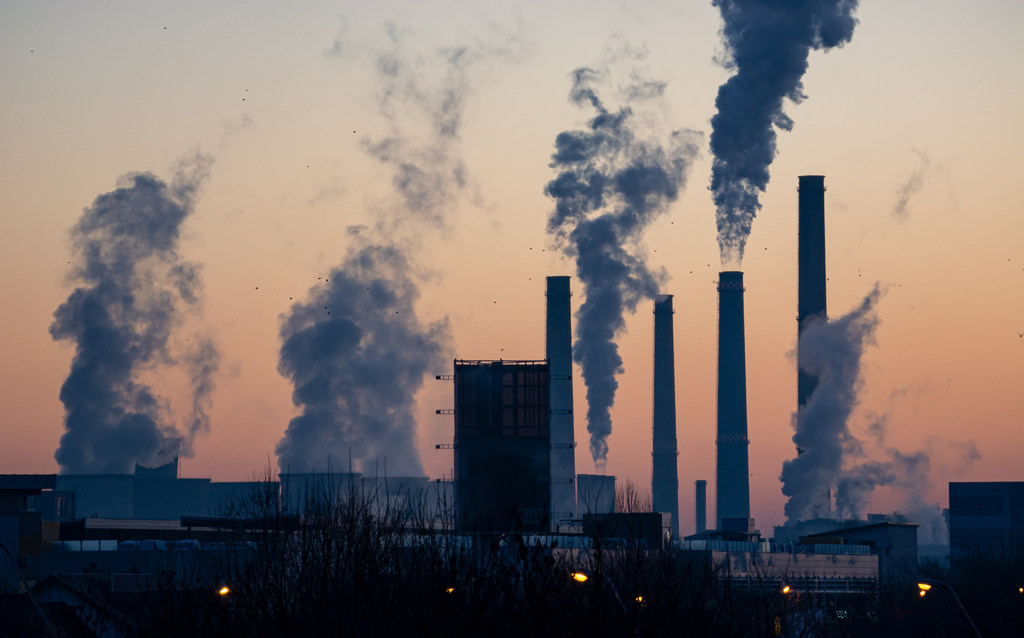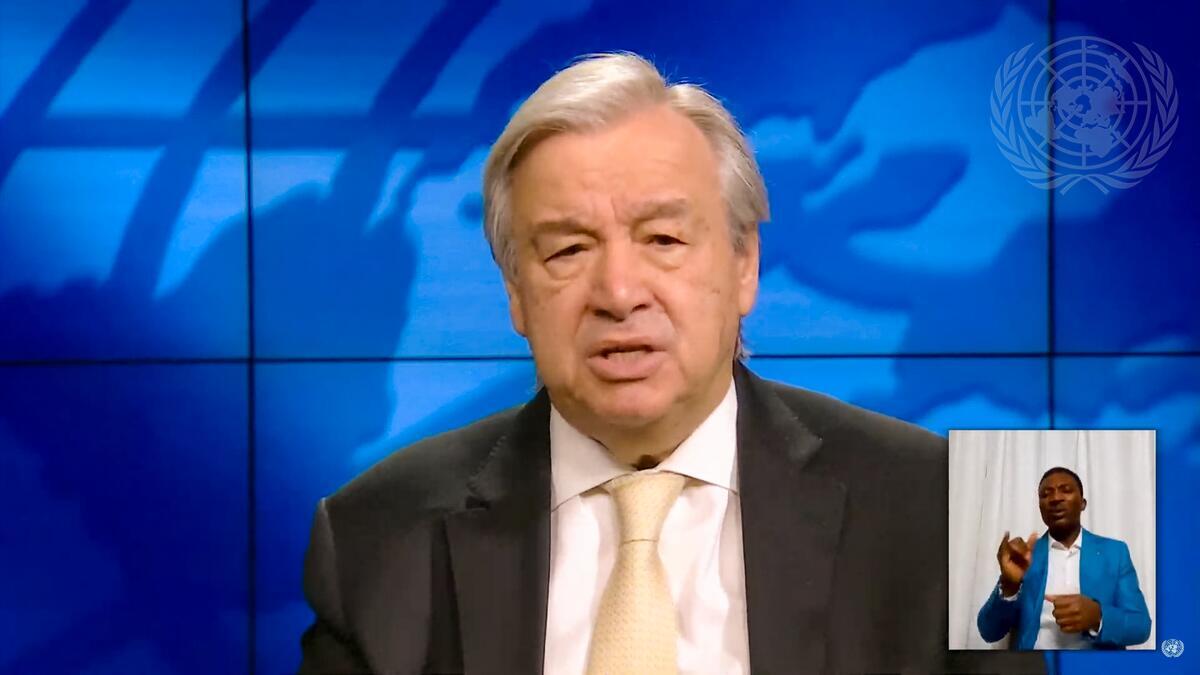By Glynn Wilson –
WASHINGTON, D.C. — All you have to do is glance at what people are paying attention to on social media and television to see that United Nations Secretary-General António Guterres was right on Monday when he said the world is “sleepwalking to climate catastrophe.”
“There is no kind way to put it,” Guterres told attendees of the Economist Sustainability Summit, speaking via video link.
He made it clear that the most ambitious goal of the Paris climate accord, limiting the warming of the Earth to 2.7 degrees Fahrenheit (1.5 Celsius) above preindustrial levels, is slipping away as dealing with the ongoing coronavirus pandemic, the war in Ukraine and other issues dominate the attention of the people of the world, sap the political willpower of leaders and undermine humanity’s efforts to slow the warming of the planet.
“The 1.5-degree goal is on life support,” he said. “It is in intensive care.”
The scientific implications of climate change are clear, Guterres said, and so is the math.
To have any chance to avoid the worst effects of climate change due to global warming from the burning of fossil fuels for energy, the country’s of the world MUST cut greenhouse gas emissions in half by 2030, and erase the carbon footprint of humans entirely by 2050.
That aspiration remains far from on track, Guterres indicated, as global emissions rise and national climate commitments lack the ambition scientists say is necessary to abandon the age of fossil fuels as rapidly as possible.
“The problem is getting worse,” Guterres said. “If we continue with more of the same, we can kiss 1.5 goodbye. Even 2 degrees may be out of reach.”
Since the late 1800s and the advent of the Industrial Revolution, the planet has already warmed more than 1 degree Celsius (1.8 degrees Fahrenheit). Scientists say that warming could pass the 1.5-degree mark early in the 2030s — without massive, transformational changes in how humans work, eat, travel and power their homes and businesses.
Guterres highlighted some of the progress made at COP 26 last year, but pointing to “the enormous emissions gap.” He conceded that “the main problem was not solved – it was not even properly addressed.”
“Keeping 1.5 alive requires a 45 percent reduction in global emissions by 2030 and carbon neutrality by mid-century,” he said, mentioning how Russia’s invasion of Ukraine threatened to become a huge setback for the concerted effort to speed up action to curb climate change.
In fact, even though he didn’t mention it, it has become clear that Russia and its dependence on oil and gas for much of its economy is the world’s most dangerous country standing in the way of progress to combat climate change, along with China. The unprovoked invasion of Ukraine has become a massive distraction from the larger problem for humanity, dominating media and public attention at a time when the press and the people should be focusing on preserving the planet as well as protecting democracy.
“As current events make all too clear,” Guterres said, “our continued reliance on fossil fuels puts the global economy and energy security at the mercy of geopolitical shocks and crises.”
As Europe and its allies seek to curtail their reliance on Russian oil and gas, he said, they must continue to prioritize the transition to clean energy instead of locking in new fossil fuel infrastructure for decades to come.
“Short-term measures might create long-term fossil fuel dependence,” Guterres said.
The United States
In the United States, where President Biden pledged to cut the nation’s carbon emissions at least in half by 2030, greenhouse gas pollution surged in 2021 as the country began emerging from the downward trend in road and air travel during the Covid crisis.
Democrats on Capitol Hill have so far failed to revive the climate provisions included in a failed $2 trillion legislative package, derailed not by Republicans but by a Democrat, West Virginia Senator Joe Manchin. In that legislation, there were proposed $300 billion of tax credits for wind, solar and nuclear energy producers and other incentives to help the country reach its goals to cut emissions.
Media outlet’s such as The Washington Post like to say that “Biden’s chance to tackle climate change is fading,” but this president has taken numerous executive actions to try to nudge the nation toward a greener future. His ambitious climate goals and promises to send billions annually in climate financing to vulnerable nations are unlikely to succeed without help from Congress. It’s clear that the selfish Republicans on Capitol Hill could care less about the survival of the human species, other than the unborn white babies they seek to protect from abortion doctors, one of the wedge issues that keeps conservative voters returning them to power.
The conservative majority on the Supreme Court could also cause problems, if they rule the wrong way in an upcoming case considering the authority of the federal government to regulate pollution from power plants.
To make matters worse, current majorities by Democrats in Congress are not assured in November 2022, and Republicans could still make a run at the White House in 2024, which would probably spell doom for any effort to make cuts in the warming trend.
Other Countries and Chaos
Deforestation continues in South America and Indonesia, removing billions of trees from the planet that could be helping the problem by soaking up and using the carbon.
Russia and China, major emitters of methane, have yet to join a global pledge to swiftly cut the amount of the planet-heating gas being released into the atmosphere.
According to Guterres, even with current national commitments, global greenhouse gas emissions are set to increase by about 14 percent during the rest of this decade. Last year alone, global energy-related CO2 emissions grew by 6 percent “to their highest levels in history,” Guterres said, as coal emissions surged “to record highs.”
The planet has already warmed by as much as 1.2 degrees, and climate disasters have forced 30 million to flee their homes, Guterres said.
“In our globally connected world, no country and no corporation, can insulate itself from these levels of chaos,” he said.
Yet he urged people not to play a blame game between developed and under developed countries.
“Our planet can’t afford a climate blame game,” he said.
Developed countries must not put the onus on emerging economies to accelerate their transition nor must emerging economies responding by saying, “you exported carbon-intensive heavy industrial activities to us in return for cheaper goods.”
“We can’t point fingers while the planet burns,” Guterres said.
Cauldron of Challenges
The Secretary-General pointed to “a cauldron of challenges” such as “scandalously uneven” COVID recovery, record inflation, and the fallout from Russia’s war in Ukraine, which risks upending global food and energy markets, “with major implications for the global climate agenda.”
As major economies pursue a so-called “all-of-the-above” strategy to replace Russian oil and gas, short-term measures might create long-term fossil fuel dependence and close the 1.5 degrees window, he warned.
“Countries could become so consumed by the immediate fossil fuel supply gap that they neglect or knee-cap policies to cut fossil fuel use,” Guterres insisted. “This is madness.”
As fossil fuels reliance continues to put the global economy and energy security at the mercy of geopolitical shocks and crises, “the timeline to cut emissions by 45 percent is extremely tight.”
Outlining a Solution
From high capital costs to technical challenges and inadequate finance, helping emerging economies to transition from coal to renewable energy has hit many roadblocks, he said.
“Developed countries, multilateral development banks, private financial institutions and companies with the technical know-how – all need to join forces … to deliver support at scale and with speed to coal-intensive economies,” he said.
Although a “major challenge,” developed and emerging economies must cooperate with each other for all G20 countries to deliver emission reductions.
And while all G20 nations have agreed to stop funding coal abroad, they must now dismantle their own coal infrastructure, he insisted.
The Secretary-General said that “even the most ambitious action” cannot erase the fact that “the situation is already bad” and in some places irreversible.
“Adaptation and mitigation must be pursued with equal force and urgency … adaptation investments need to be dramatically scaled up to keep pace with accelerating impacts,” he said, calling on all donors and technical partners to work with the UN and vulnerable governments to identify and fund projects and programs.
Global Finance
The top UN official also pressed for new, simplified eligibility systems and increased adaptation and resilience investment.
Beginning with public finance, wealthier countries must make good on their 2022 climate financial commitment of $100 billion to developing countries – with international financial institutions making it a priority.
Secondly, he said blended finance requires those institutions to partner with the private sector for joint investments, and innovation, to unlock trillions for the transition.
Finally, private finance must invest “far more” in net-zero and climate-resilient transitions for emerging economies.
He concluded by laying out steps to meet the 1.5 degree goal, beginning with accelerating the phase-out of coal and fossil fuels; implementing a just and sustainable energy transition; and strengthening national climate plans.
Also imperative is to help emerging economies urgently phase out coal; increase climate finance to unlock needed trillions; decarbonize major sectors – such as shipping, aviation, steel and cement – and protect the most vulnerable by ensuring an equal focus on adaptation.
“It is the right thing to do – and the profitable thing to do,” he argued. “That’s how we will move the 1.5-degree goal from life support to the recovery room.”
Instead of “hitting the brakes” on decarbonizing the global economy, the Secretary-General urged everyone to “put the pedal to the metal towards a renewable energy future.”
___
If you support truth in reporting with no paywall, and fearless writing with no popup ads or sponsored content, consider making a contribution today with GoFundMe or Patreon or PayPal.















